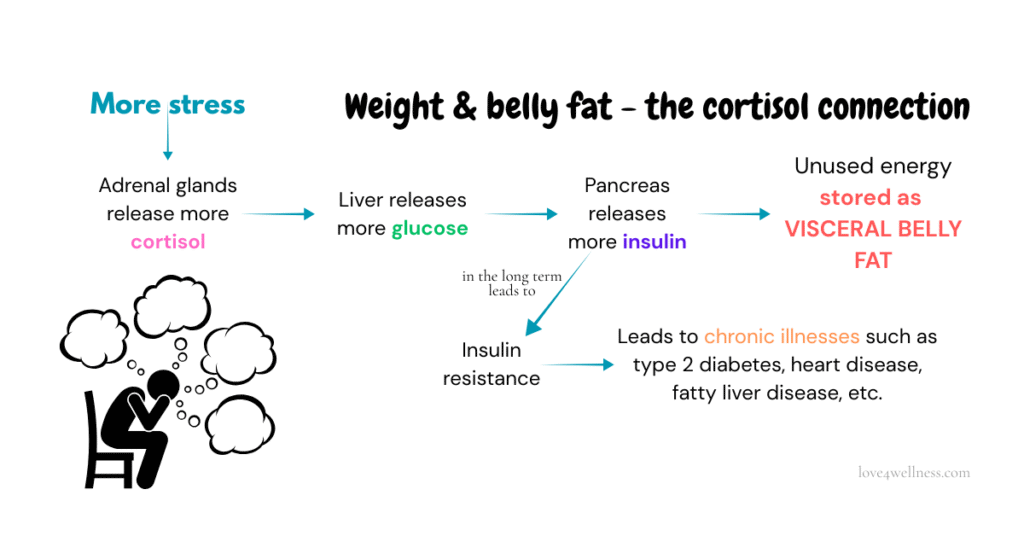This post is for one of my friends—someone active and mindful of what they eat, yet struggles to lose weight, especially around the belly. After some digging, I discovered something many of us overlook: stress affects weight loss just as much as diet and exercise.
Yes, you read that right—stress can be as powerful as calories or workouts and can significantly influence your weight loss goals. The reason? Stress triggers both physiological and behavioral changes that quietly sabotage your efforts, often contributing to stubborn fat, particularly around the belly.
We often assume that weight management is simply a math equation: Calories In vs. Calories Out. However, that equation crumbles when your hormones are running the show—especially cortisol, the body’s main “stress hormone.”
So, let’s dive deeper into how stress affects weight loss and what it means for your metabolism and waistline.
The Cortisol Trap: How Stress Hormones Store Stubborn Fat Around the Belly
When you’re stressed—whether it’s a major crisis or the daily anxiety of a looming deadline—your adrenal glands release a surge of cortisol. This was once a survival tool—read during caveman times—flooding your body with glucose (sugar) to prepare you for “fight or flight.”
Here’s the problem: in modern life, we rarely “fight or flee.” Instead, we just sit with the stress. The result? Elevated cortisol levels linger in your system, and this is one of the main ways stress affects weight loss. Your body interprets the constant stress as a signal that a famine or crisis is coming—and responds by storing fat, especially around your midsection.
The body’s response to chronic stress directly interferes with metabolism and where you store fat, explaining why stress and belly fat are so closely linked:

Glucose Spike & Insulin Resistance:
When you’re stressed, your body releases cortisol, which signals the liver to release stored glucose (sugar) into the bloodstream. This is your body’s ancient survival mechanism — meant to give you a burst of quick energy to fight or flee danger. But in modern life, we rarely use that extra energy. Instead, we sit in traffic, at our desks, or scroll through emails.
Over time, this unused glucose keeps your blood sugar levels elevated. To manage the overflow, your pancreas releases more insulin — the hormone responsible for moving sugar into cells. Chronic stress means cortisol and insulin stay high for too long, eventually causing your cells to become resistant to insulin’s effects. This condition, known as insulin resistance, makes it harder to manage blood sugar and easier to gain fat. It’s one of the clearest examples of how stress affects weight loss by quietly slowing your metabolism and encouraging fat storage.
The Visceral Threat:
Here’s where stress and belly fat connect directly. High cortisol doesn’t just make you store more fat — it changes where your body stores it. Under chronic stress, your body prefers to deposit fat deep in the abdominal cavity, wrapping around organs such as the liver, intestines, and pancreas. This is called visceral fat — the stubborn kind that doesn’t respond easily to dieting or exercise.
Visceral fat is metabolically active, meaning it releases inflammatory chemicals that can further increase cortisol and insulin levels, creating a vicious cycle. Over time, this type of fat raises your risk for serious conditions like heart disease, type 2 diabetes, and fatty liver disease. So when you notice belly fat that won’t budge despite healthy habits, remember: it’s not just calories — it’s cortisol.
Hormone Imbalance:
Chronic stress doesn’t only affect your metabolism; it also scrambles your hunger and fullness signals. Cortisol interacts with two key appetite-regulating hormones — ghrelin (the “I’m hungry” hormone) and leptin (the “I’m full” hormone). Under stress, ghrelin levels rise, making you crave more food, while leptin levels drop, meaning you feel less satisfied even after eating.
This hormonal tug-of-war drives you to eat more — especially sugary, high-fat comfort foods that provide a quick dopamine boost. Over time, this pattern reinforces the cycle of stress and belly fat, leaving you wondering why your appetite feels out of control and why healthy eating suddenly seems harder to maintain.
The Behavioral Shift: How Stress Derails Your Habits
Cortisol doesn’t just affect hormones. Chronic stress also triggers behavioral changes that affect weight loss and weight management.
- Emotional Eating: Cortisol increases cravings for calorie-dense foods (high-sugar, high-fat) because they provide a quick dopamine hit that temporarily “blunts” the stress response. This leads to stress eating for comfort rather than hunger—one of the key ways stress and belly fat build up.
- Reduced Physical Activity: Stress causes both mental fatigue and physical exhaustion, significantly lowering motivation. This often results in reduced exercise or increased sedentary behavior, further slowing metabolism and contributing to stubborn belly fat.
- Sleep Disruption: Stress often leads to insomnia or poor-quality sleep. A lack of restorative rest disrupts hunger hormones, raises evening cortisol levels, and intensifies cravings for high-calorie foods—another mechanism illustrating how stress affects weight loss.
- Poor Food Choices: Time pressure, mental exhaustion, and emotional strain can push you toward fast food, processed convenience meals, or skipping meals entirely. These habits reinforce the cycle of stress and belly fat, making it even harder to see results despite a good diet.
The Silent Stressors: 10 Everyday Habits That Drain Your Energy
We often assume stress comes from big, obvious events: a major deadline, a move, or a crisis. But the real culprits aren’t the loud, dramatic kind—it’s the subtle, daily habits constantly nudging you physically or mentally.
This low-grade, chronic stress keeps your body in a perpetual state of “fight-or-flight,” slowly increasing cortisol and burning out your mental and physical reserves. The danger is that these habits feel “normal,” so you don’t realize they’re what’s truly exhausting you.
Here are 10 hidden sources of daily stress that are silently draining your health and energy and affecting your weight loss goals:
i) The Sleep Schedule Shuffle:
Going to bed at midnight on weekends and waking up early on weekdays may feel harmless, but your body sees it as jet lag. This “social jet lag” throws off your internal clock, disrupts hormones like cortisol, and leaves you feeling foggy and irritable. Over time, it can make even small daily challenges feel overwhelming.
ii) Chronic Multitasking:
Answering emails while eating lunch and half-listening to a meeting doesn’t save time—it drains your brain. Constantly switching between tasks forces your mind to reset again and again, creating mental fatigue. Instead of finishing strong, you end up feeling busy but strangely unaccomplished, which adds to your stress.
iii) The Power of “Happy” Stress (Eustress):
Not all stress comes from negative situations. Big “happy” changes—like a wedding, promotion, or new baby—still push your body into overdrive. Even positive excitement can keep your nervous system on high alert. That’s why you may feel exhausted after the celebration, wondering why joy leaves you so tired.
iv) Ignoring Subtle Dehydration:
A mild lack of water often goes unnoticed until it shows up as fatigue, irritability, or headaches. What’s happening underneath? Dehydration raises cortisol, the main stress hormone. So when you’re already juggling a busy day, being even 1–2% dehydrated makes it harder to manage emotions and keep calm.
v) Perfectionism as a Daily Driver:
Chasing “perfect” feels like aiming high, but really it’s an endless treadmill. The bar keeps moving, and nothing feels good enough. Instead of being a motivator, perfectionism fuels self-criticism and a constant sense of failure—even when you’re achieving plenty. It’s stress disguised as ambition.
vi) Noise and Clutter:
A messy desk or nonstop background noise doesn’t seem like a big deal, but your brain is working overtime to filter it out. Visual and auditory clutter create a low-level state of tension. You may not notice it, but your body does—making it harder to concentrate, relax, or fully recharge.
vii) The Daily Doom scroll:
That “quick scroll” through social media or news headlines at night isn’t harmless. Negative stories or endless comparisons keep your brain wired in problem-solving mode. Instead of winding down, your nervous system acts like it’s preparing for a threat, which disrupts sleep and fuels restless thoughts.
viii) The Commute and Lack of Control:
Being stuck in traffic or waiting on a delayed train is more than an inconvenience—it’s a control issue. Stress skyrockets when you feel powerless to change your situation. Over time, these daily frustrations add up, leaving you drained before your day even begins.
ix) Using Caffeine and Alcohol as Mood Regulators:
Coffee sharpens focus, but too much keeps stress hormones running high. Then, alcohol may seem like a quick way to relax, but it disrupts sleep cycles, forcing your body to work harder overnight. Together, they create a rollercoaster of highs and lows that wears you down.
x) Ignoring Your Body’s Signals (Emotional Invalidation):
When you tell yourself, “It’s fine,” or “I shouldn’t be upset about this small thing,” you are invalidating your emotional experience. Suppression doesn’t eliminate the feeling; it just pushes it down. The unresolved emotion becomes an internal pressure cooker, causing you to feel irritable, moody, or physically tense without understanding why.
💡 Practical Strategies: Behavioral & Lifestyle Changes to Lower Cortisol
Stress management isn’t just about relaxation—it’s about metabolism. These small daily shifts help reset your nervous system and turn off the fat-storage signal:
- The 5-Minute Reset: Try diaphragmatic (belly) breathing twice a day for five minutes each to calm the vagus nerve and stimulate the parasympathetic “rest and digest” system, reducing cortisol.
- Move for Mood: Engage in low to moderate-intensity movement daily (like a 30-minute brisk walk or gentle yoga) to help burn off stress hormones and reduce stress and belly fat, without overexerting your system.
- Consistent Sleep Rule: Maintain a consistent wake-up time (within 30 minutes), even on weekends, and enforce a screen-free buffer (30–60 minutes) before bed. This helps recalibrate your cortisol curve and prevents sleep-related spikes that contribute to stress and belly fat.
- Declutter with One Touch: Handle mail, paperwork, or clutter immediately or place it in a designated “to-do” spot. Reducing visual stimuli can lower low-grade psychological stress, which in turn supports a healthy metabolism and highlights how stress affects weight loss.
- Balance Your Blood Sugar: Pair carbohydrates with protein or healthy fats (such as an apple with peanut butter) at every snack and meal to help stabilize your blood sugar levels and prevent sudden blood sugar crashes. Sudden sugar crashes trigger cortisol and adrenaline release, reinforcing cravings and fat storage—another way stress and belly fat sneak in.
The Bottom Line
If diet and exercise aren’t delivering the results you expect, it’s time to shift your focus from calories to cortisol. By managing hidden stressors, you’ll reset your hormones, support your metabolism, and finally give your body the balance it needs.
Which silent stressor do you think is affecting you the most—and which one will you tackle first this week?
